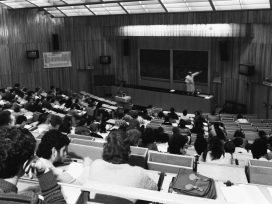Whatever the eventual outcome – and it may be no more than provisional – of the strikes and protests in French universities in 2009, the movement has set the seal on the rift and the total lack of mutual understanding between the powers-that-be at the highest level and the world of those who work in the field of knowledge. The astonishment of academics and researchers at the contemptuous speech made by the President of the Republic on 22 January 2009 has not been forgotten; his contempt was heartfelt enough to have been voiced in the presence of those at whom it was aimed.
From the point of view of the social sciences and the humanities it looks like a frontal attack: from 2009 on, in the area of research, the rate of replacement of retiring CNRS-funded (Centre national de la recherche scientifique) researchers is 0.53. The longer-term aim (for at least three years) is 0.5. When the age pyramid is taken into account it becomes clear that this is going to be a real bloodletting. These factors have to be seen as the expression, in terms of facilities and posts, of the political and ideological gulf between government and academia, a gulf that is especially wide in the above disciplines.
Systematically under-funded public services
While this crisis may not be directly economic in nature, it nevertheless relates to the climate of penury in which French universities have to work: to the dilapidated state of the buildings and their inadequate equipment one must add the inadequacy of funding that is typical of most university libraries and of their administrative support structures. France devotes only 1.3 per cent of GDP to higher education, which places it in a median position within the OECD, a rather pathetic result if you reflect on the country’s proud boast that its system sets great store by public services. By comparison, the USA devotes 2.9 per cent of GDP to higher education and Canada 2.6 per cent. The average cost of a student is euro 10 150, or 50 per cent of that for a US or Swiss student. In addition, this average cost masks significant disparities since it can vary between euro 8970 per annum for a student in a state university and euro 13 880 for a student in one of the preparatory classes for the grandes écoles.
Institutions caught in a vice
The best students in secondary education, apart from a proportion of those who choose to study law or medicine, are shying away from universities and giving preference to the preparatory classes for the grandes écoles. The research that comes under the umbrella of the universities has to deal with this competition at the same time, as at least a certain number of the grandes écoles do little to advance the careers of researchers. At the same time, a number of students are turning towards selective programmes in Instituts Universitaires Techniques, which they expect to provide better training and greater employability after graduation. Admission to these programmes may also be an undesirable result of a strategy intended to bypass the early years of university.
The universities are thus caught in a vice between the grandes écoles and the IUTs; the latter are, in fact, universities themselves but choose to make a point of their special character. Of the 524 300 young people who passed the baccalauréat in 2007, 77.2 per cent enrolled in higher education outside an apprenticeship scheme. Of those who have followed the “general” baccalauréat option, the vast majority – although fewer and fewer – go to university; in the same year, 55.6 per cent opted for a university course other than in an IUT. The failure rate continues to be endemic in the early years. Finding ways to make new students’ abilities a better match for the initial stages of university teaching is a matter of the utmost urgency. Certain measures (such as the plan for succeeding in the licence examination) are playing a part, but they are not succeeding in curbing the perverse effects of a system that is selective everywhere except in the early years of university. If we are determined to go on insisting that the bac is the first qualification in the higher education sector and that no process of entry selection is therefore required, then the entire system for the early years at university needs to be rethought to allow greater freedom of movement between programmes and more individual support. This is a matter of human resources in establishments that, on average, devote 53 per cent of their budget to teaching staff and 20 per cent to non-teaching staff.
The present industrial action relates to the difficulty that is encountered when this kind of funding has to be found, when attractive programmes, which have genuinely professional outcomes, have to be designed in a way that will not place too heavy a burden on either the research requirement or the teaching of a wider, more general education. A good many lecturers have, by their dedication and by allocating a large proportion of their time to the early years, neglected their own research. Pointing the finger at them rather than rewarding their efforts by providing them with the means to resume their research is neither fair nor efficient.
A reform too far?
Whilst this conflict involves a range of problems, it is essentially focused on two: “masterization” and revision of the status of teacher-researchers. However, what is really happening becomes clear when seen in context. Just as one can only network cultural programmes at night or over the summer, the ministry likes to push its reforms through over Easter and in the summer. Is it really fair to bank on the campuses being deserted so that it can present the university community with a fait accompli? And even if it is legitimate to challenge the term “community”, given that it is so varied and heterogeneous, the spectre of the ideological, political and scientific stances taken by teacher-researchers who are hostile to the new reforms will have shown that they really do raise a question that needs an answer and that they exist in an environment that is characterized by tensions. Indeed the succession and rate of delivery of the reforms – the minister did, in the end, admit that “the boat had been too heavily laden” – set light to the powder-keg. The series of reforms was all the more unpalatable because it was accompanied by the barely subliminal message that reforming universities is an impossible task.
The accusation is more than just unfair. There was the Bologna Process and the change to a new schedule for granting diplomas, hand in hand with a revision of the programme structures. Then there was the requirement to respond to the passing of the law on university autonomy that less than one third of institutions have adopted so far. What would have helped would have been a pause at that point. Oh no! Since Xavier Darcos (education minister 2007–2009 – ed.) wanted the opportunity to leave his mark, at a time when reform of lycées had had to be postponed, he introduced, at breakneck speed, “masterization” in teacher training, which had to be implemented without delay. Were teachers really so badly trained that it was necessary to change the system in an atmosphere of haste and disorder? Over the same period, in the ministry of higher education’s area of responsibility, revision of the status of teacher-researchers was seen as a provocation, given that it went along with a reduction in the number of posts. Indeed, this major political error leaves one stunned (was it the Prime Minister playing a nasty trick on his higher education minister, by any chance?): reducing the number of posts at the same time as reforming a public service, so that one is led to conclude that the latter was only there at all to make the former possible! This mistake was all the more to be deplored inasmuch as the modularization of services was essential and the error led to a discourse which, bolstered by the blunders that had been committed, consisted in not wishing to change any aspect of a system that satisfied very few people. There is nothing scandalous about making changes to services in relation to the abilities, the rate of scientific and pedagogical investment, both individual and collective, and the needs of the establishments. The change could allow a teacher-researcher, who would have control of his working time, to alternate years more focused on research with years in which he would concentrate more on teaching, as happens in some foreign universities. It would be essential for him to be relieved of some duties in order to compensate for the excessive workload suffered by anyone who agrees to fulfil certain heavy and thankless administrative tasks. However, it is important that acceptance of this scheme and this way of regulating workloads should not be a pretext for a reduction in the number of administrative posts. It is likewise important that the maximum number of teaching hours should be clearly stipulated.
The cumbersome nature of the negotiations made disagreements loom larger and positions more rigid. As a result, the process of revising the decree and then implementing it in the form of a ministerial directive, while eliminating a considerable part of its substance, did not restore calm but rather created a feeling that the conflict was simply shifting ground, wriggling out of the early demands and returning to the rift that we discussed at the outset of this article.
Semantic shifts and the question of governance
The world of learning is the world of discourse but not necessarily of double discourse. The point is, that by introducing autonomy for universities, the LRU law (law relating to the freedoms and responsibilities of universities) created a double language and resulted in misunderstandings and confusions between autonomy and independence. In the end, the law was understood as a weapon to be used against the independence of the researcher. Suddenly, the slightest degree of independence attaching to the post (of teacher-researcher) corresponded to the autonomy of the (university) institution. Consolidating the power of the principal of the university, even though he was elected by his fellow-academics, was, predictably, a cause of concern in a milieu that had hitherto been safe from any possible calls to order or revision of its working conditions. Consequently, this had a negative effect on the question of evaluation.
In a recent petition, a number of signatories from all sectors made a very relevant call “not to confuse autonomy in management (mainly local) and scientific autonomy (which is inseparable from national statutory guarantees)” and “to devise institutional systems that would provide university staff with real powers to match those of university principals and governing bodies”. Indeed, respecting the tradition of collegiality, which is indispensable, has to go along with autonomy. But the problem is not straightforward: confidence in principals who have genuine room for manoeuvre is indispensable if they are to build development strategies for the establishments that they manage. Vote-catching and “localism” were already present before the LRU and the opening up of university authorities to civil society ought to go without saying. We are a long way from that.
No future?
Not only do careers look rather like an obstacle course with ambushes and bottlenecks, that course is especially difficult for women: the proportion of established university teachers is just 18 per cent as against 36.1 per cent for teachers as a whole, 32.9 per cent for teacher-researchers and 41 per cent for senior lecturers, and salary structures are also still unfavourable. A senior lecturer starts out – after a minimum of about 10 years’ hard slog – on euro 1790 net salary a month. The creation of chairs of excellence is a worthwhile stimulus but one which comes up against the egalitarian preoccupations of a good number of academics; in no way does it sort out the problem of the majority of teacher-researchers nor the problem of the shortage of resources for research – paid students could assist with research for instance, the kind of help that researchers sorely need.
There has been mention of the swap that has happened between poor levels of pay and independence. But there is also a formidable trap that has been added to this first system for managing the link between the institution and the teacher-researcher. This is the rapidly adopted stratagem of the (downward) realignment of effort and remuneration. The combined low levels of recognition and remuneration have a destructive effect. This makes the debate on evaluation even more tense.
Assessment, a dirty word
You would have to be completely ignorant about the reality of working in a university to believe that your work was not assessed. It can even happen that this mania for assessment causes the person with the job of filling in forms and lists of duties to waste precious time. The question is not about the principle of assessment but, on the one hand, about its methods and, on the other, about the use that is made of the assessment that is carried out. How many times does it have to be repeated that the length of time and the often uncertain and tentative procedures that characterize research require very careful and subtle forms of assessment? Lists of publications, themselves organized into a hierarchy using criteria that are always debatable, will never be more than an imperfect reflection of the variety and flexibility of research work. Assessment needs to be qualitative, collegiate, regular, but without becoming the kind of chivvying that lays emphasis solely on productivity.
We might add, incidentally, that assessors consider certain collateral effects of their method to be negligible. The first relates to the respective positions of books and journals, the second to the economic model that applies to the spread of knowledge. On the first point, researchers and the laboratory in which they work are judged in terms of scientific publications in refereed journals. Books are a negligible quantity. If Claude Lévi-Strauss’s Tristes tropiques had been judged in this way, it would have had less value than an article in the International Journal of Anthropology. Does that make sense? The second point needs a brief explanation. The scientific journals market is largely in the hands of Elsevier, Kluwer, Blackwell and Springer. In this market, the raw material of which is doubly subsidized since its authors are researchers who are being paid by laboratories that are nearly always publicly funded and since the work done by referees is not paid, it is above all publicly-funded libraries that take out subscriptions to scientific journals. The manner in which universities are assessed thus leads to certain forms of publication being privileged to the detriment of others and, incidentally, certain publishers to the detriment of others too. The work carried out by journal publishers is essential, but to believe that their two functions – the certification and dissemination of scientific knowledge – can only be carried on through articles and that books have little scientific value, is a choice that is not neutral, not only in terms of the concrete procedures for production and diffusion of knowledge, but also for the future publication of scientific books.
Cooperation versus competition
Development of universities is taking place against a background of competition. The Academic Ranking of World Universities (the “Shanghai classification”), globalization, the intensification and rapidity of exchanges nurtured by new developments in technology and communications, all create a climate of emulation but also generate forms of competition that are not necessarily desirable. The kind of policy that has been implemented, particularly with “Campus Plans”, however indispensable it may be, is part of the race to be recognized. In such a climate, inequalities in funding appear all the more unfair. They go beyond the clash between universities and preparatory classes for the grandes écoles. They create fault lines separating universities themselves, which, de facto, achieve differing levels of excellence and fulfil contrasting socio-educative roles.
For too long the importance of releasing additional funds for universities in disadvantaged urban areas has been ignored. As a matter of urgency we must get away from the implied message that says that all the good parts of these universities must abandon the banlieues and make their way to the town-centre campuses. We must make the budgetary resources and the means of communication available to demonstrate that winning strategies can be developed elsewhere than in the cosseted centres of our large cities. And, in this connection, we must put right the absolutely scandalous procrastination of the government with regard to the release of funds intended for the Condorcet Campus on the northern periphery of Paris.
A movement that is half inventive and half depressive
If our universities are not, as some have claimed, a disaster area, the present conflict nevertheless represents an attack on their identity. That universities have always been places for debate and discussion is beyond any doubt but one gets the feeling that escape routes have been drawn up on every side (towards the preparatory classes and the grandes écoles, towards foreign universities in the case of the children of that gilded élite that the extravagant pay-packets of company bosses have helped to create), whilst overcautious, mistrustful interest groups have strengthened their positions. How is it that those involved in the conflict have managed to avoid asking questions about the respective status of, on the one hand, teacher-researchers and, on the other, CNRS researchers, particularly those in the social sciences, when both are required to produce research of excellent quality but the former also have to carry out a heavy teaching load while the latter have only to teach on an overtime basis and at a carefully measured rate? It is essential that we move towards a single standard.
It is true that the reforms were combined with arguments that were almost exclusively focused on excellence as the outcome of fierce competition, on the implementation of mechanisms for self-development, the result of which would be that whoever had proved his worth would see himself relieved of those tasks that were considered thankless, while the others would find themselves plunged into a spiral of time-consuming commitments that would be almost permanently incompatible with the development of any research project. They did not help to bring up the points that are really causing anger.
The conflict included a call to boycott Le Monde on the grounds that this newspaper had sided with the powers-that-be! Not only were certain matters not raised, the invective levelled at those who raised doubts about certain aspects of the struggle or the form that it was beginning to assume became more and more frequent. Is it not the case that refusing to face up to the cost of the strike and blaming all the damage on an allegedly irresponsible ministry amounts to shooting yourself in the foot? It is true that innovative forms of protest were put into effect but they should have been used in place of the obliteration of teaching, which, in some places, was replaced with an active strike that was unevenly supported by students. Baffled by a movement that is not their own, the students joined in the revolt in small numbers in some places, in larger numbers in others, with new demands that blurred more than ever the point of a conflict that was already very complex.
It turned out that the strike inflicted a double penalty on the financially poorest students who were less well equipped for university study to start with and for whom the costs are considerable, even though enrolment fees are low. In the end, those who had not yet proceeded very far through their programme simply left, once and for all, a milieu that failed to understand them and that they had found so difficult to enter in the first place. The state of poverty of some students who cannot manage to find accommodation is deplorable in this respect. In 2006, three-quarters of students were in some form of paid employment at some point in the year. Every effort has to be deployed to end unemployment and to ensure that qualifications retain their value in a time of crisis when the employment rate among young people between 15 and 24 threatens to exceed 25 per cent.
One of the original forms of protest, the ronde des obstinés (a form of protest begun in France in March 2009 by staff and students of the University of Paris VIII. It involved numbers of protestors walking round in a circle outside the Hôtel de Ville in Paris. The action continued for several days, with relays of protestors keeping the circle going – trans.), which refers, rather inaccurately, to another struggle, that of Argentine mothers demanding information about their “disappeared” children, combines a rather poetic note with overtones that it might have been better to avoid: was it really such a good idea to walk in this way to lament a kind of university that had disappeared; to walk round and round could simply mean going round in circles and making a virtue out of obstinacy, when it might have been preferable to replace it with a more modest mixture of tenacity and conviction? The question then remains: will the conflict only come to an end if we can return to how things were before? By insisting on that, we would be fostering the dangerous myth of universities that would never change.
We have tried to show that this conflict is being played out on several levels and that it requires an urgent response and greater consideration for a badly paid profession, a profession whose functions are, nevertheless, vital. The long duration of the conflict raises one final question: is it still possible, when the world of our universities is in crisis, to find a compromise that will not amount to a sell-out?






